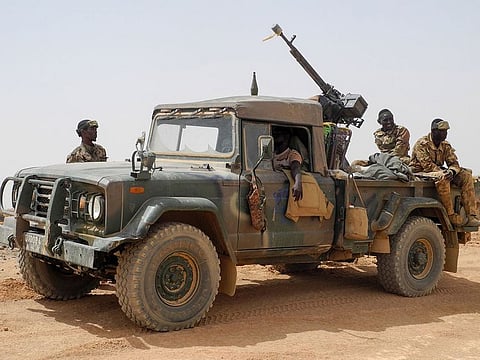About 115 killed in apparent ethnic attack in Mali: mayor
The village of Ogossagou is completely devastated, says mayor

Death toll in Mali village attack hits 115: officials
Update: A group representing ethnic Peulhs in central Mali says the provisional death toll from a morning militia attack has risen to 115.
Abdoul Aziz Diallo, president of Tabital Pulaaku, gave the figure Saturday after receiving detailed information from authorities at the scene. Initially, witnesses said at least 40 had been slain.
Diallo said the victims included pregnant women and small children. Another leader of a local Peulh militia said the village chief of Egossagou had also been killed along with some of his grandchildren.
It was not immediately possible to independently corroborate the death toll.
Members of the Dogon group accuse the Peulhs of supporting these those linked to terror groups in the country's north and beyond. Peulhs have in turn accused the Dogon of supporting the Malian army in its effort to stamp out extremism.
Region reeling from worsening ethnic violence
Gunmen killed about 60 Fulani herders in central Mali on Saturday, a local mayor said, in one of the deadliest such attacks in a region reeling from worsening ethnic and jihadist violence.
The assault on the village of Ogossagou came as a UN Security Council mission visited Mali to try to find solutions to violence that killed hundreds of civilians last year and is spreading across West Africa's Sahel region.
Security Council mission visited Mali to try to find solutions to violence that killed hundreds of civilians last year and is spreading across West Africa's Sahel region.
Moulaye Guindo, mayor of the nearby town of Bankass, said the armed men, who were dressed as traditional Donzo hunters, encircled and attacked Ogossagou at about 4am (0400 GMT).
"It's a very heavy death toll," he told Reuters. "The village of Ogossagou is completely devastated." One village resident, who asked not to be identified, said the attack appeared to be in retaliation for an Al Qaida affiliate's claim of responsibility on Friday for a raid last week that killed 23 soldiers.
The group said the raid was payback for violence by Mali's army and militiamen against the Fulani.
Jihadist groups linked to Al Qaida and Daesh have exploited ethnic rivalries in Mali and its neighbours Burkina Faso and Niger to boost recruitment and render vast swaths of territory virtually ungovernable.


![The incident occurred in the early hours of Tuesday in Kampani Zurak community, located in the Wase area of Plateau state. [Illustrative image]](http://media.assettype.com/gulfnews%2Fimport%2F2022%2F12%2F13%2FSTOCK-ambulance_1850a298a2c_large.jpg?w=320&auto=format%2Ccompress&fit=max)
